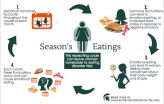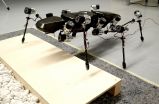(Press-News.org) People who occupy the extreme ends of the political spectrum, whether liberal or conservative, may be less influenced by outside information on a simple estimation task than political moderates, according to new research published in Psychological Science, a journal of the Association for Psychological Science.
The research, conducted by psychological scientists Mark J. Brandt and Anthony Evans of Tilburg University and Jarret T. Crawford of The College of New Jersey, suggests that because political extremists hold their own beliefs to be superior to the beliefs of others, they may be more resistant to the so-called anchor bias, even for non-political information.
"Political differences really drive a wedge between people, and previous research has shown that people on the political extremes are more likely to perceive large partisan differences and political polarization and to be intolerant of people with different political beliefs," says Brandt, who led the research.
"Some describe extremists as having some sort of mental deficiency that leads them to latch onto extreme political positions, while others describe extremists as having particularly strident and confident beliefs," explains Brandt. "We wanted to know which one of these possibilities seemed to be more likely."
To find out, Brandt and colleagues employed a commonly used anchoring task, in which participants are asked to make an estimate after being given an anchor number. For example, participants may be asked: "The distance between New York and San Francisco is greater than 2,000 miles. How far is it?"
Research has shown that the anchor number greatly influences participants' estimates -- that is, people work up or down from the number provided, making final guesses that are closer to the anchor. People who start with large anchor numbers end up with overly high estimates, and vice versa for people who start with small anchor numbers.
The task is politically neutral, and so it provides a tool for teasing apart the two competing characterizations of extremists. If political extremists take a relatively unthinking approach, then they're likely to rely on heuristics in making decisions and their estimates will be close to the anchor number. If, however, extremists are especially thoughtful and confident decision makers, they should produce estimates that are farther away from the anchor.
For the first experiment, the researchers analyzed data originally collected as part of the Many Labs project, examining data from 4,846 participants drawn from 25 samples of participants in the United States. All of the participants answered four anchor-related questions -- some were randomly assigned to receive low anchors (e.g., distance is longer than 1,500 miles) and others were assigned to receive high anchors (e.g., distance is shorter than 6,000 miles) for a given question.
In general, the anchors provided by the experimenters influenced participants' estimates, in line with many previous studies.
But the data also showed that participants' ideology and attitudes played an important role: People who were ideologically more extreme and who reported more extreme attitudes on specific political issues produced estimates that were farther away from the anchors, suggesting greater resistance to the anchor bias.
A second experiment confirmed these findings and revealed a potential mediating factor: belief superiority. People who were more extreme in ideology and political attitudes also reported stronger support for the idea that their beliefs were superior to those of others. And people who reported greater belief superiority, in turn, produced estimates that were farther from the anchor.
Importantly, the results couldn't be explained by participants' level of education or their so-called need for "cognitive closure." Furthermore, the results were similar when the direction of the anchor was specified and when it was unspecified (e.g., Is the population of Chicago more or less than 200,000?).
"These findings suggest that political extremists may make more confident judgments and are not necessarily unthinkingly relying on heuristics," says psychological scientist and lead researcher Mark J. Brandt of Tilburg University in the Netherlands.
While previous work has often found personality and cognitive differences between liberals and conservatives, this new research shows a consistent effect of political extremity.
"We aren't sure why there are differences between liberals and conservatives in some situations, but not in others -- this will be a useful puzzle to solve in the future," says Brandt.
INFORMATION:
For more information about this study, please contact: Mark J. Brandt at m.j.brandt@tilburguniversity.edu.
All data and materials have been made publicly available via the Open Science Framework and can be accessed at https://osf.io/pqf9r/. The complete Open Practices Disclosure for this article can be found at http://pss.sagepub.com/content/by/supplemental-data.
This article has received badges for Open Data and Open Materials. More information about the Open Practices badges can be found at https://osf.io/tvyxz/wiki/view/ and http://pss.sagepub.com/content/25/1/3.full.
The article abstract is available online: http://pss.sagepub.com/content/early/2014/12/11/0956797614559730.abstract
The APS journal Psychological Science is the highest ranked empirical journal in psychology. For a copy of the article "The Unthinking or Confident Extremist? Political Extremists Are More Likely Than Moderates to Reject Experimenter-Generated Anchors" and access to other Psychological Science research findings, please contact Anna Mikulak at 202-293-9300 or amikulak@psychologicalscience.org
New Rochelle, NY, December 16, 2014-Consuming caffeinated or sugary drinks can affect the body's metabolism, causing changes in heart and respiratory rate and weight gain. The results of a new study exploring whether individuals respond differently to caffeinated drinks that do or do not contain sugar and to sugar alone are published in Journal of Caffeine Research: The International Multidisciplinary Journal of Caffeine Science, a peer-reviewed publication from Mary Ann Liebert, Inc., publishers. The article is available free on the Journal of Caffeine Research website ...
Eliminating health disparities between races is a goal of many groups and organizations, but a team of sociologists suggests that finding the reasons for the differences in the timing of black and white deaths may be trickier than once thought.
Life expectancies for black people are shorter and more uncertain, on average, than to those of whites, according to Glenn Firebaugh, Roy C. Buck Professor of American Institutions and professor of sociology and demography, Penn State. A higher lifespan variability -- the variability in the ages at which people die -- among blacks ...
Unauthorized immigrants who previously have been removed from the United States are more than 2.5 times more likely to be rearrested after leaving jail, and are likely to be rearrested much more frequently than those who have never been removed, according to a new RAND Corporation study.
The findings generally support strategies adopted by federal immigration authorities and some law enforcement agencies to focus their immigration enforcement efforts on immigrants who previously have been removed, who are viewed as posing a bigger criminal threat.
Researchers studied ...
Unlike in mathematics, it is rare to have exact solutions to physics problems.
"When they do present themselves, they are an opportunity to test the approximation schemes (algorithms) that are used to make progress in modern physics," said Michael Strickland, Ph.D., associate professor of physics at Kent State University.
Strickland and four of his collaborators recently published an exact solution in the journal Physical Review Letters that applies to a wide array of physics contexts and will help researchers to better model galactic structure, supernova explosions ...
The genetic abnormality that drives the bone cancer Ewing sarcoma operates through two distinct processes - both activating genes that stimulate tumor growth and suppressing those that should keep cancer from developing. These findings by Massachusetts General Hospital (MGH) investigators, published in the November issue of Cancer Cell, may lead to new therapies targeting these aberrant mechanisms.
The second most common bone cancer in children and young adults, Ewing sarcoma is caused by a chromosomal translocation - switching of genetic segments between two different ...
EAST LANSING, Mich. - 'Tis the season of plenty of food and drink. While celebrating should be joyful, for some women, it's not. All the holiday temptations can add another layer to an already complicated biological process.
It's well known that women undergo hormonal changes every month due to the menstrual cycle. These changes can cause women to eat more, which is a natural, biological occurrence.
However, Michigan State University Foundation Professor Kelly Klump has found that the increased food intake causes some women to become much more preoccupied with their ...
ITHACA, N.Y. - In the fight against global warming, carbon capture - chemically trapping carbon dioxide before it releases into the atmosphere - is gaining momentum, but standard methods are plagued by toxicity, corrosiveness and inefficiency. Using a bag of chemistry tricks, Cornell materials scientists have invented low-toxicity, highly effective carbon-trapping "sponges" that could lead to increased use of the technology.
A research team led by Emmanuel Giannelis, the Walter R. Read Professor of Engineering in the Department of Materials Science and Engineering, has ...
HOUSTON -- (Dec. 16, 2014) -- In one of the most comprehensive laboratory studies of its kind, Rice University scientists traced the uptake and accumulation of quantum dot nanoparticles from water to plant roots, plant leaves and leaf-eating caterpillars.
The study, one of the first to examine how nanoparticles move through human-relevant food chains, found that nanoparticle accumulation in both plants and animals varied significantly depending upon the type of surface coating applied to the particles. The research is available online in the American Chemical Society's ...
This news release is available in German. A research team at Bielefeld University has succeeded in teaching the only robot of its kind in the world how to walk. Its first steps have been recorded in a video. You can watch them in Bielefeld University's latest posting on 'research_tv'. The robot is called Hector, and its construction is modelled on a stick insect. Inspired by the insect, Hector has passive elastic joints and an ultralight exoskeleton. What makes it unique is that it is also equipped with a great number of sensors and it functions according to a biologically ...
DURHAM, N.C. - Duke University scientists have developed new forensic tracers to identify coal ash contamination in water and distinguish it from contamination coming from other sources.
"These new tools can be used by federal and state regulatory agencies to monitor the environmental effects of coal ash and determine whether it has or hasn't impacted the environment," said Avner Vengosh, professor of geochemistry and water quality at Duke's Nicholas School of the Environment. "They can be used to trace the coal ash effluents to their source, even in watersheds where ...



